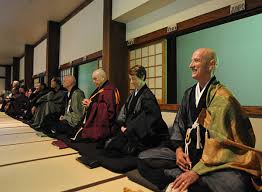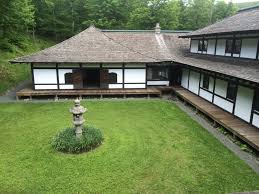


3 weeks in Dai Bosatsu Zendo, Livingston Manor, NY
When you tell people you’re heading off to spend time in a Zen Buddhist Monastery they’re usually jealous. They assume you’ll be having an experience akin to going to a spa or taking a workshop at a retreat center. They don’t envision you up at 4:30 every day, chanting, meditating, and working hard until 10pm when you gratefully fall into bed. They don’t envision you down on your hands and knees scrubbing floors with a wet rag, cleaning toilets, vacuuming cushions, and scouring pots.
Much of the monastery experience is comprised of work… doing the hundreds of myriad daily tasks that make management of a well-run monastery possible. But the work serves multiple functions. Yes, it keeps the monastery clean and orderly, well functioning. In fact, it stays clean and orderly to the exacting standards of Japanese Rinzai Zen which would probably give any Hilton Hotel a run for its money. But it also serves as a useful container to observe the workings of one’s mind. Since so many of us in the Western world are privileged, it might serve to illuminate Western minds even more starkly than those in Japan. We’ve grown up in a “do it all for yourself” culture so most of us are unused to service to begin with and many of us will do anything to avoid manual labor.
What do you imagine goes through someone’s mind when they’re scrubbing the tile floors of shower stalls? I can’t speak for others but I can tell you what goes through mine. “Are you kidding me?! I’ve got to do this shit! Who do they think I am?! I’m a world class filmmaker. I don’t deserve to be down on my hands and knees doing this. I should be at the Academy Awards accepting Oscars!” Of course, that’s only one tape loop. Another is “My back is killing me! I’m too old for this! Don’t they have any respect for elders? Are they fucking with me? Maybe if I finish early I can lie down for a while. I’ll never survive this… I’ll never last until yoga at 4pm. It’s abuse!” There are many other tape loops… Complaints, complaints, complaints… For me, most of them involve some sort of victimization and self-righteousness. What are your favorites?
Obviously, it’s humbling. But the truth is I’ve been so battered by career challenges over the last 20 years that humility is a lesson I’ve been taught over and over again. I’m well familiar with it. So there’s a different, self-punishing tape loop that alternates with the self-aggrandizing ones. “Well, I failed in life so this is pretty much what I deserve. No Academy or Emmy awards, no project backing from Hollywood studios or TV networks, nobody in LA wants to see my next script or film. The world will never know my brilliance. I might as well jump off a bridge, saving everyone, myself included, from more misery.” Poor, poor pitiful me. That tape may be a shock to some of you readers but it’s Greatest Hits territory for me. Though Jews certainly don’t have a lock on victimization, I do tend to associate that particular loop with my cultural and ethnic heritage.
So go the workings of the mind. “This should be. This shouldn’t be.” “I’m right. They’re wrong…” Frankly, most of it’s useless. Worse than useless, it’s harmful. Harmful because we believe it. Harmful because we let it become a song that we sing over and over to ourselves like a lullaby. How ironic. We sing lullabies to comfort ourselves, to ease our pain and make sense of the world. How ironic then that our mental “songs” add to our suffering and cloud our sense of the world. When we let those “songs” – those mind streams – take us out of the present moment, out of what’s actually happening, it harms us further than whatever is actually taking place. It adds to our suffering. If we choose otherwise we can actually rest easily, even joyfully, in the present moment, without singing those songs, without applying judging filters. Yes, even when what’s actually happening is cleaning toilets.
I got to the point where I was delighted when I could actually see that I had picked up some piece of dirt, some dust bunny. Partly because it signaled to me the work was of demonstrable value; I could see it was having an impact. That’s not Zen per se but there’s certainly nothing wrong with it. More importantly, I was taking pride, even delight, in doing the work itself. One thing I can tell you with certainty, Zen monasteries like Dai Bosatsu have really classy wooden floors. Beautiful hard woods like cherry and walnut, maybe even hickory. Though hard on the knees, getting down on beautiful floors like that is a real privilege. Having guests walk into a spotless room where even sheets and blankets are folded in matching ways, all the closet hangars are pushed left, and the night light is on, is deeply satisfying because it eases their burdens and puts them at peace. Mudita or “sympathetic joy” some Buddhists call it.
Two key events happened during my stay. I had my birthday – the first one in many years without my wife at my side to celebrate – and the election. Talk about tape loops! All I wanted to do was crawl into bed and sing lullabies to myself. But in fact, without repressing any emotions, I stayed present to the demands of my monastery life – dust-mopping floors, sweeping tatamis, washing more dishes, and, lo and behold, I had a wonderful time both days. I felt grounded and secure, resting in my tasks and meditation. I felt very grateful to be where I was. It affirmed that my Zen practice is only going to prove more fundamental to my life going forward. It is my key to equanimity.
To be happy nothing exceptional is needed. No one needs to give us anything. In fact, if we’re looking for it outside ourselves we’re already lost. But even looking for it within can misroute us. We don’t have to be SuperMonk, we don’t have to meditate til our eyes pop out, we don’t even have to chase enlightenment… It’s right here! Right now! No lights flashing, heavenly choruses, levitation. Just “Ordinary mind.” That was my great realization. Even my Buddhist practice – chasing enlightenment, doing meditation “right,” being a good yogi – can be cause for additional self-judgments of not being good enough. As long as I’m caught in judgments of the way things should be, whether of myself or others, I’ll never be free. And to be free all I have to do is ground in what’s here right now. Nothing exceptional – just be alert to all the information my senses bring me. Be careful when and how mental filters are applied to that experience, learn how they color that experience, keep coming back to what’s here, now, and be free. Absolute immersion in everyday, humdrum, unexceptional reality is absolute freedom.
Does meditation help? You bet. During our five day “Fall sesshin” we were meditating 6-7 hours a day. During the other two weeks, observing regular monastery life, we slept in til 5:30, went to bed at 9, and usually only meditated 2-3 hours a day. I had a palpable sense of “I’m here. Almost like a prisoner! Almost like they’ve thrown away the key! Better make the best of it…”
If only we treated every living day that way.
